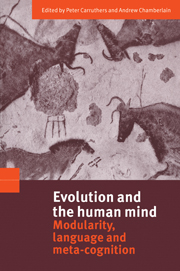Book contents
- Frontmatter
- Contents
- List of contributors
- Preface
- 1 Introduction
- 2 Massively modular minds: evolutionary psychology and cognitive architecture
- 3 Individual differences in early understanding of mind: genes, non-shared environment and modularity
- 4 Darwin in the madhouse: evolutionary psychology and the classification of mental disorders
- 5 Evolution of the modern mind and the origins of culture: religious concepts as a limiting-case
- 6 Symmetry and the evolution of the modular linguistic mind
- 7 Evolution, communication and the proper function of language
- 8 The evolution of knowledge
- 9 Mind, brain and material culture: an archaeological perspective
- 10 The evolution of strategic thinking
- 11 On the origin of the human mind
- 12 The evolution of consciousness
- 13 Evolution, consciousness and the internality of the mind
- References
- Author index
- Subject index
1 - Introduction
Published online by Cambridge University Press: 18 December 2009
- Frontmatter
- Contents
- List of contributors
- Preface
- 1 Introduction
- 2 Massively modular minds: evolutionary psychology and cognitive architecture
- 3 Individual differences in early understanding of mind: genes, non-shared environment and modularity
- 4 Darwin in the madhouse: evolutionary psychology and the classification of mental disorders
- 5 Evolution of the modern mind and the origins of culture: religious concepts as a limiting-case
- 6 Symmetry and the evolution of the modular linguistic mind
- 7 Evolution, communication and the proper function of language
- 8 The evolution of knowledge
- 9 Mind, brain and material culture: an archaeological perspective
- 10 The evolution of strategic thinking
- 11 On the origin of the human mind
- 12 The evolution of consciousness
- 13 Evolution, consciousness and the internality of the mind
- References
- Author index
- Subject index
Summary
The extension of Darwin's theory of evolution to human form, function and behaviour has always been controversial. Evolutionary explanations of the human mind, with its apparently unbounded capacities and responsiveness to environmental influences, and of human culture, with its myriad creative diversity and transcendence beyond mere functionality, have been particularly contested. As a result, evolutionary approaches in the social and cognitive sciences have gained ground slowly and haltingly. But insofar as the human body has been moulded and shaped by evolutionary pressures operating in our ancestral past, it seems likely that the biological structures and mechanisms underlying human cognition will also have been selected for; and in this sense, at least, the human mind must have an evolutionary history. What is rather more contentious is whether properties intrinsic to the mind itself were selected for in evolution. In this brief opening chapter we survey the range of stances which can be taken towards this issue, and we outline some recent developments in psychology, archaeology, anthropology, philosophy and the neurosciences which provide the background for the chapters which follow.
From modularity to evolutionary psychology
Ever since the cognitive revolution in psychology began, with Chomsky's devastating review (1959) of Skinner's Verbal Behavior (1957), the evidence has gradually been mounting in favour of the modularity of many mental functions and capacities – that is, in support of the view that cognition is subserved by a number of innately channelled, domain-specific systems whose operations are largely independent of, and inaccessible to, the rest of the mind.
- Type
- Chapter
- Information
- Evolution and the Human MindModularity, Language and Meta-Cognition, pp. 1 - 12Publisher: Cambridge University PressPrint publication year: 2000
- 7
- Cited by



